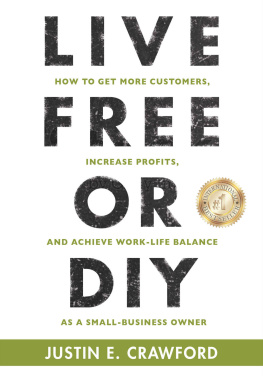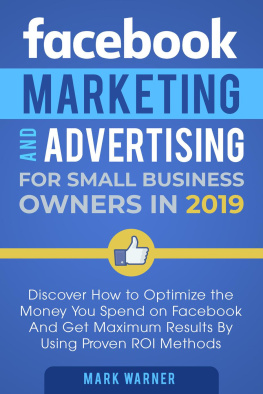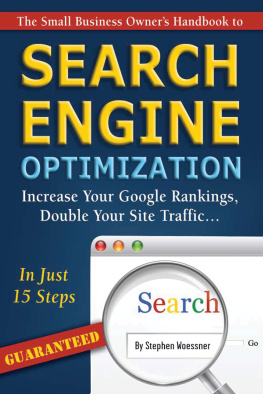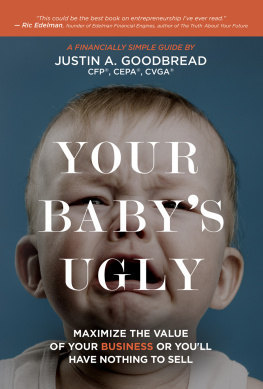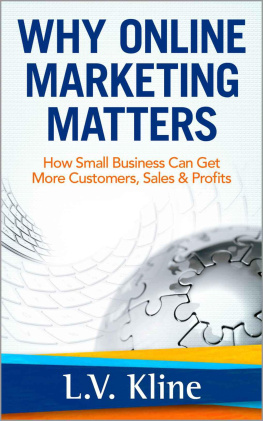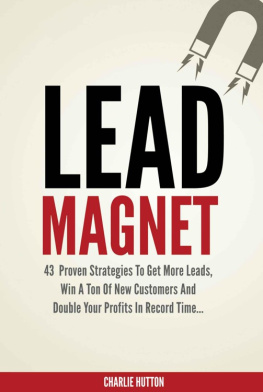Copyright 2016 Justin E. Crawford
All rights reserved. No part of this book may be reproduced in any form or by any electronic or mechanical means including information storage and retrieval systems without permission in writing from the author. The only exception is by a reviewer, who may quote short excerpts in a review.
Although the author and publisher have made every effort to ensure that the information in this book was correct at press time, the author and publisher do not assume and hereby disclaim any liability to any party for any loss, damage, or disruption caused by errors or omissions, whether such errors or omissions result from negligence, accident, or any other cause. The advice and contents in this book are the authors opinion. The author is not making any claims or promises, and if you would like to put anything into action, please consult a business professional.
Published in the United States by Redwood Digital Publishing. Books are available at special discounts when purchased in bulk for sales promotions or corporate use. For more information, please write: and include the title of the book in the email subject line.
Printed in the United States of America
ISBN Hardcover: 978-0-692-67123-8
ISBN eBook: 978-0-692-67122-1
Library of Congress Control Number: 2016937090
Cover Design: Michelle Manley
Interior Design: Ghislain Viau
TABLE OF CONTENTS
PART I
How DIY Is Drowning Your Business
T he chief problem facing most small-business owners is not a lack of effort, will, or talent. Instead, the problem is time and resource management. Its a question of figuring out how to do the right things at the right times with the right resources. And thats a tricky balanceespecially because the most effective strategies are sometimes counterintuitive.
of this book will turn the prevailing wisdom on its head to show why DIYing isnt just a bad idea, but how it could squash your otherwise promising business. It will also introduce some key alternative strategies to set you on the path to success.
In this section youll find:
Why your time is more valuable than your money.
Why confusing cheap and efficient will cost you big.
How to tap into the start-up capital you never knew you had.
How to use the Golden Formula for maximizing the value of your time.
How to build a team of expertson a shoestring budgetto achieve more than your business ever could have before.
The Million-Dollar Calculator: Money Matters, but Time Drives Your Bottom Line
So often people are working hard at the wrong thing. Working on the right thing is probably more important than working hard.
Caterina Fake (Founder, Flickr)
M aybe you can remember the precise moment the idea came to you. It was an ordinary dayjust another day when you were working at that tiresome job and watching someone else reap the reward for your hard work. Then it hit you. The entrepreneurial jolt: You would start your own business!
After all, people had been telling you for a long time that youre great at what you do. And you are great at what you do, perhaps most of all because you love doing it. So when the idea hit you to start your own business, you knew it was the right thing. You also wanted the chance to become your own boss, make your own schedule, and achieve financial freedom.
So you summoned your courageand your savingsand you charged boldly forward. Immediately, though, that meant you had to incorporate the business and set up a bank account and perhaps a credit line. Soon you had your first customers, and you realized you needed a bookkeeping system. Plus, since most of your potential customers had never heard of you, you had to figure out how to get your name out there. That meant youd need some kind of marketing plan. All of this was like the Wild West: You started your own business because youre an expert at what you do, not because you knew the nitty-gritty of small-business operations.
But youre smart, so you knew you could learn how to do accounting, set up a website, and develop a marketing plan, not to mention hire employees and supervise them, manage payroll, and stay on top of labor regulations, in addition to the seemingly endless stream of other tasks that came your way.
Ill figure it out, you thought to yourself. Im an entrepreneur, after all!
And so you kept charging forward.
A year passed, and then two. You found yourself working around the clock week in, week out. And you had a feeling you werent making much money, though you werent precisely sure, since the answer was buried in those account books that you never seem to have the time to balance.
And it was at the end of yet another grueling week, when you came home late on a Saturday night and collapsed on the couch, that you began to wonder if there was a better way.
The Million-Dollar Calculator
Ive worked with a lot of small-business owners, and the story you just read describes entrepreneurs in every industry, from small-town pizza shops to lawyers running their own firms to tech wizards launching new-media platforms. Besides working themselves to exhaustion and feeling unsatisfied with the results, what do all these entrepreneurs have in common?
Theyre all trying to build a million-dollar calculator.
Think for a moment about a little plastic calculator. You can pick one up at the dollar store for pennies. Now imagine that, instead of obtaining a calculator by buying one (or downloading an app onto your phone), you decide the only way is to build it yourself.
You assemble plastic and wires and metal and rare earth minerals, not to mention the ingredients to build a battery too. But you soon discover that the process is frustrating and may take yearsnay, decadesfor you to build this little calculator all by yourself. And as you wade further and further into the process, you realize all the time and materials and know-how required to build this calculator will cost you far more than you imagined. When its all said and done, its probably going to cost you a million dollars.
If everyone who needed a calculatoror a computer, or a car, or a piece of clothing, or a pair of shoes, or anything elsetook the approach of trying to build it from scratch, our entire global economy would grind to a halt. Despite having built automobiles for most of a century, Toyota wouldnt be able to sell another car. Apple wouldnt sell another computer. Your favorite neighborhood takeout joint wouldnt sell one more meal. And meanwhile, everyones life quality would plummet, because no one would benefit from anyone elses expertise.
Yet the vast majority of entrepreneursa group that includes brilliant doctors setting up their own practices and bright young attorneys starting out on their own, not to mention masters at the art of making mouthwatering pizza or photo-worthy cappuccinoattempts the equivalent of building that million-dollar calculator by trying to DIY every piece of their business.

